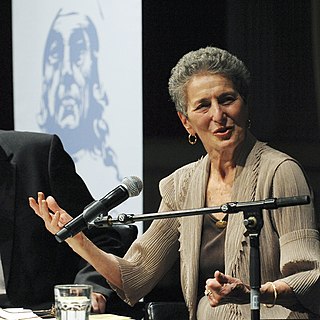A Quote by Natalie Zemon Davis
Carla Hesse has given us an astonishing new look at women's struggle for independent expression and moral autonomy during the French Revolution and afterward. Denied the political and civil rights of men, literary women plunged into the expanded world of publication, answering the men's philosophical treatises with provocative novels about women's choices and chances. Lively and learned, The Other Enlightenment links women from Madame de Stael to Simone de Beauvoir in an alternate and daring path to the modern.
Quote Topics
About
Alternate
Answering
Astonishing
Autonomy
Chances
Choices
Civil
Civil Rights
Daring
Denied
Enlightenment
Expression
French
French Revolution
Given
Independent
Learned
Links
Literary
Lively
Look
Madame
Men
Modern
Moral
New
New Look
Novels
Other
Path
Philosophical
Political
Provocative
Publication
Revolution
Rights
Struggle
Us
Women
World
Related Quotes
When we consider that each of us has only one life to live, isn’t it rather tragic to find men and women, with brains capable of comprehending the stars and the planets, talking about the weather; men and women, with hands capable of creating works of art, using those hands only for routine tasks; men and women, capable of independent thought, using their minds as a bowling-alley for popular ideas; men and women, capable of greatness, wallowing in mediocrity; men and women, capable of self-expression, slowly dying a mental death while they babble the confused monotone of the mob?
Marjan. I have told him tales of good women and bad women, strong women and weak women, shy women and bold women, clever women and stupid women, honest women and women who betray. I'm hoping that, by living inside their skins while he hears their stories, he'll understand over time that women are not all this way or that way. I'm hoping he'll look at women as he does at men-that you must judge each of us on her own merits, and not condemn us or exalt us only because we belong to a particular sex.
If you're creating a slave situation, you would almost never bring women. And if we look at Slavery for example, we look at the Greeks and the Romans, right? It was always men. They never brought any women. Because women carry the seeds of the revolution, right? And if you have the men by themselves, then you can do what the French did with the Blackfeet, which is breed them out.
It turns out that a lot of women just have a problem with women in power. You know, this whole sisterhood, this whole let's go march for women's rights and, you know, just constantly talking about what women look like or what they wear, or making fun of their choices or presuming that they're not as powerful as the men around. This presumptive negativity about women in power I think is very unfortunate, because let's just try to access that and have a conversation about it, rather than a confrontation about it.
It's true that in a lot of western feminist movements, you see women working singularly from men. Suffragettes and the women's rights movement in the 60s here, but when I think of the Islamic feminist movement, I think of a lot of men who are very much standing with the women. It really feels like in equal numbers. Women are catching up in the field because we were not given access to knowledge and encouraged into these studies and so these men are helping us and empowering us. They are men of conscience who are fed up with this assumption that they're entitled.
When you look at how men and women are living together, there are two processes at work. One, women are rising in the middle class; their earning potential is rising compared to men. It has been underway for 100 years, and nothing is going to stop it. On the other hand, women are denied iconic positions of power - equity partnerships law firms, Hollywood salaries.
Notable American Women is an enchanting and moving novel. Like Italo Calvino and Lewis Carrol, Ben Marcus reconfigures the world that we might see ourselves in a cultural and moral landscape that is disturbingly familiar, yet entirely new. As though granted a new beginning, Marcus renames the creatures of our world, questions who we are and who, as men and women, we might be. Notable American Women is a wonder book, pleasurable and provocative.
People ask me almost every day, "Why? You are successful, you have kids, you have grandchildren, so why?" Feminist women are seen as unsatisfied. But all women in the world, if they are well aware of inequality, are unsatisfied women. They don't have the same rights as men, and there is no freedom until there is equality between men and women.
I get very frustrated when I hear women saying, "Oh, feminism is passé," because I think feminism means empowerment. Men can be feminists, too! Many men are feminists. We need feminism. It's not against men; it's about the empowerment of women. It's the respect of women - giving women equal rights, the same opportunities.
Romance novels are tales of brave women taming dangerous men. They are stories that capture the excitement of that most mysterious of relationships, the one between a woman and a man. They are legends told to women by other women, and they are as powerful and as endlessly fascinating to women as the legends that lie at the heart of all the other genres.
Patriarchy is not men. Patriarchy is a system in which both women and men participate. It privileges, inter alia, the interests of boys and men over the bodily integrity, autonomy, and dignity of girls and women. It is subtle, insidious, and never more dangerous than when women passionately deny that they themselves are engaging in it.








































